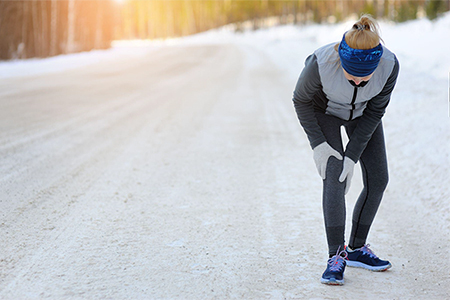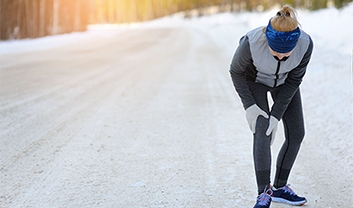
Winter is here and with it comes cold weather. Did you know that cold weather can have effects on your joints? Oftentimes, individuals suffering from knee injuries have reported that cold weather causes increased aching pain in their knee. The most common knee injuries susceptible to cold weather irritation include knee trauma, patellar tendonitis, and runner’s knee. There are several ways that cold weather can affect your knees contributing to increased pain, swelling, and stiffness.
Here are some effects that colder weather has on knees:
- Barometric Pressure changes
Cold weather causes a drop in the barometric pressure in the atmosphere. Pressure changes associated with cold weather can aggravate the tissue surrounding your injured knee. Lower pressure causes the injured tissue in your knee to expand, causing increased pain and discomfort. - Joint Fluid Thickening
Synovial fluid is the thick, gel-like fluid found in your body's joints, including the knee. This fluid acts to lubricate the joint allowing easy mobility. Colder weather can cause this fluid to become more viscous affecting its free-flowing ability. This contributes to joint stiffness reducing the mobility of your knees, and increasing your discomfort. - Exposed Nerve Endings
Cartilage is a smooth connective tissue between the bones in your knee joint acting as a cushion, protecting your bones from damage. Knee injuries can damage this tissue and continued wear and tear will cause thinning of the cartilage. Thinning of this cartilage will expose nerve endings, increasing their sensitivity to changes in weather and pressure, causing increased pain in the winter months. - Increased inactivity
While rest is essential for healing a knee injury, it is also vital to engage in low-impact exercises to build strength around your knee. Yet as temperature drops, the motivation to get up and be active lessens. Lack of movement and exercise will lead to the weakening of the muscles around your knee, providing less support to your knee joint once it heals.
As the weather gets colder, it is important to maintain good joint health to avoid any potential knee injuries. If your knee is already injured, there are ways to combat the increased pain and swelling associated with the cold. Heating pads, staying active, and stretching are all great ways to attempt to reduce swelling and ease your pain.
If you have suffered from a knee injury and need guidance on how to combat your pain in these colder months, contact Dr. Kai Mithoefer for a consultation today!
Dr. Kai Mithoefer is board certified in both Orthopedic surgery and Orthopedic sports medicine and is a fellowship trained shoulder specialist. Dr. Mithoefer is an internationally recognized specialist for complex shoulder and knee injuries with over 15 years of experience with the treatment of work related injuries. Dr. Mithoefer has published more than 100 scientific articles and book chapters and is a frequent speaker at national and international orthopedic meetings.











